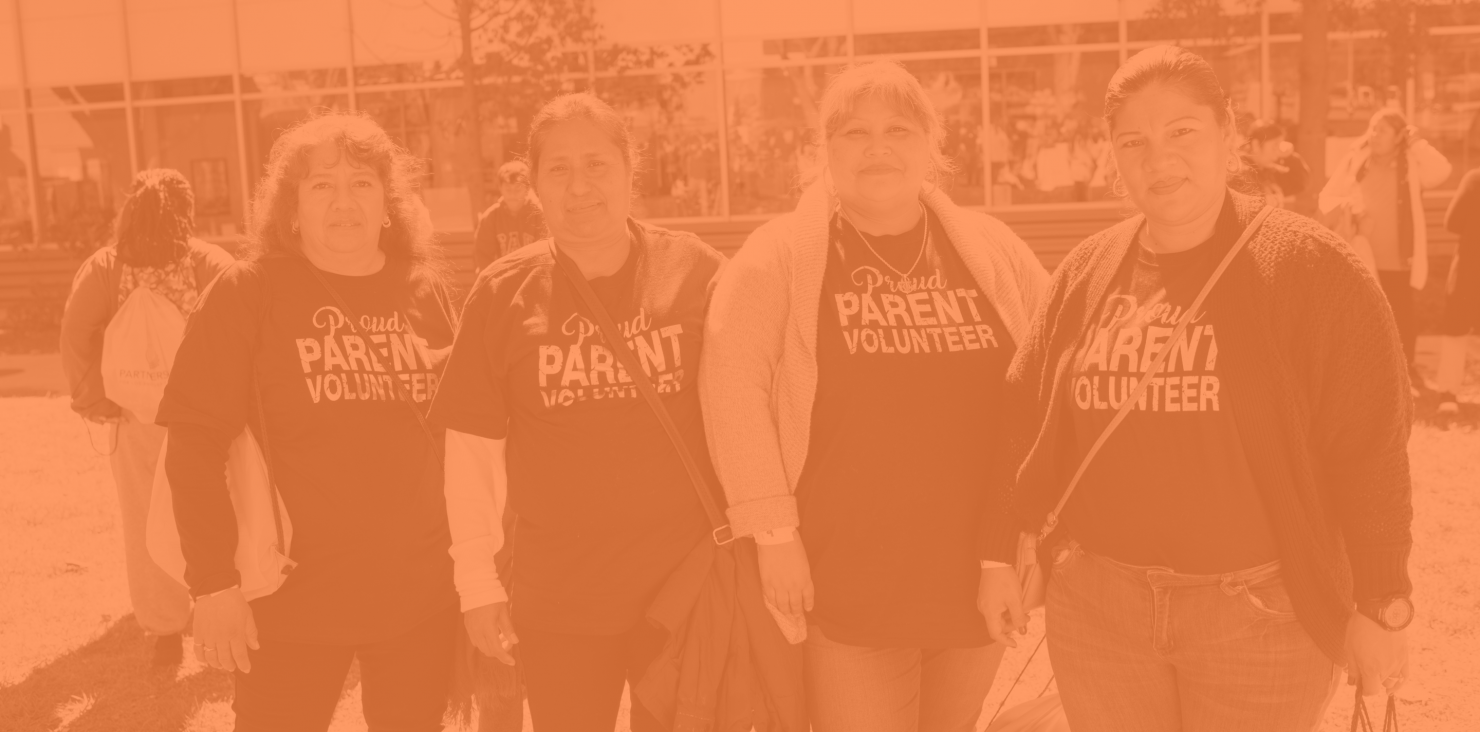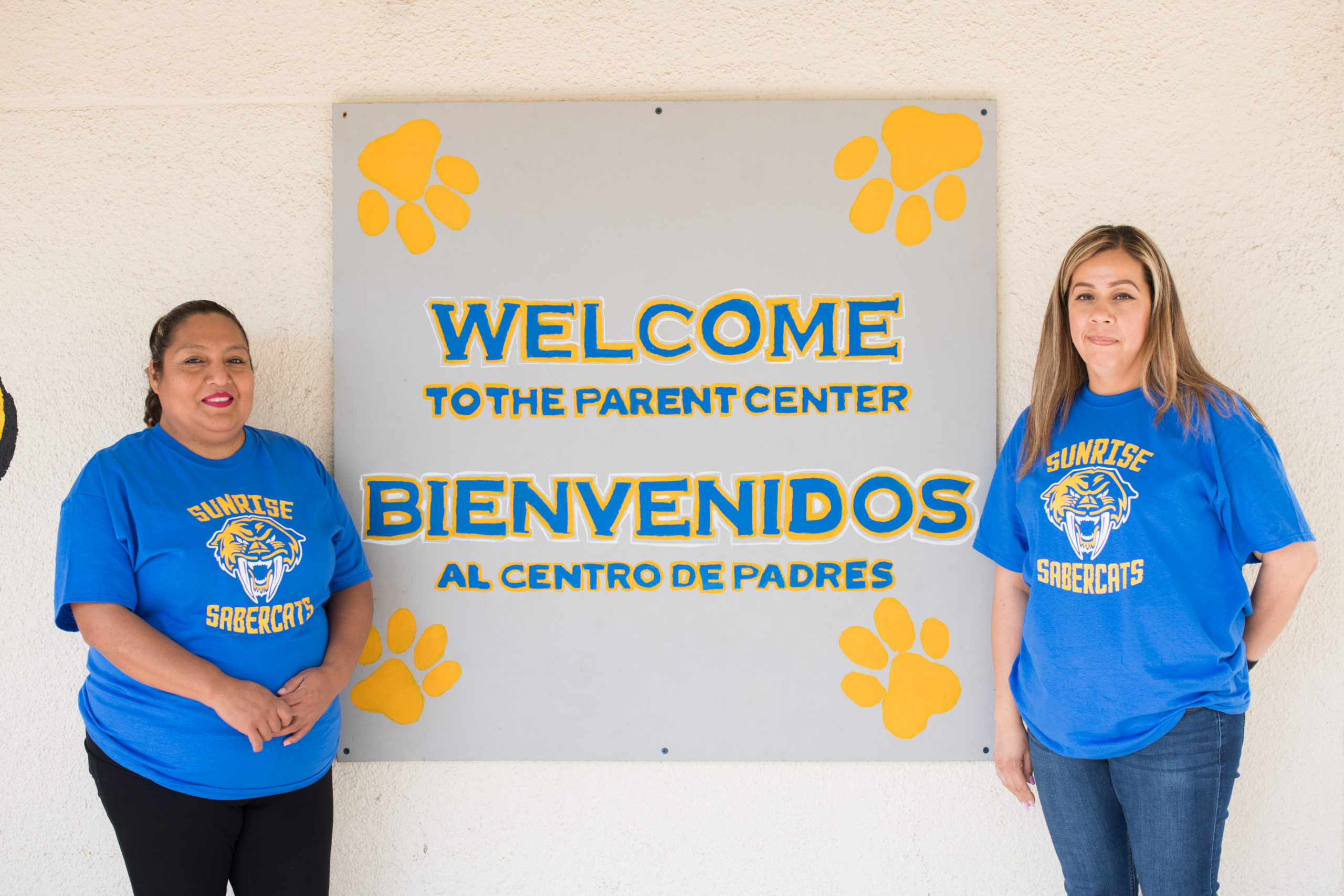
Family Engagement
inside our Practice
“The Partnership makes me feel valued as a parent and supports me in my leadership as a Community Representative at my school. They care for our community, our children, and are leaders in the fight for a better public education.”Leticia CalderonParent, Dolores Huerta Elementary
We believe that school communities and families must work together as equal partners to accelerate student outcomes and support all students to complete college.

Family engagement must be paired with core instructional strategies to bring families, district staff, school leaders, teachers, and school staff together in support of a shared vision for student success. Our experience shows us that school transformation is possible when schools have systems in place that share power with families and communities and collaborate as partners in shared decision-making processes. In under-resourced communities like the ones we work within, there is a presumption that families can’t be engaged at the level of higher-income communities because of their personal obligations. We believe that low-income families and families of color can and will participate in their child’s education, particularly when the environment and space is created to support their engagement.
While we believe in mutual accountability for a student’s success, we feel the onus is on the school system to change to support meaningful family engagement. Our approach focuses on creating spaces where families have true power and voice to influence change at their schools. We do this by resourcing Parent Centers at every school site, coaching site-based Family Action Teams, and facilitating the Parent College program.
What Sets the Partnership Approach Apart
We build the capacities of school leaders, teachers, and families to engage in collective action for equity and student achievement.
Parent Centers
We provide capacity building for school sites to establish and resource Parent Centers to create a welcoming and inclusive environment for all parents.
Family Action Teams
We provide capacity building for site-based Family Action Teams to develop the school’s family engagement vision and execute action plans that engage families in activities focused on student academic outcomes.
Parent College
We coordinate and host a year-long Parent College program in each of our three communities to empower parents to learn about the education system, how to prepare students for postsecondary success, and how to advocate for their children’s education.
parent centers
Across our network, we actively invest in creating welcoming, engaging, and inclusive Parent Centers and hiring and supporting a parent to serve as a Community Representative at the school site. Creating these environments is one of the first steps to ensuring more community engagement and increased attendance.
A first step in any school’s family engagement system is to create a welcoming, inclusive, and service-oriented environment that values parents and families as partners.
In our schools, we’ve learned that family engagement will only be successful if we first address the community-level barriers – such as racism, stereotyping, and distrust – that limit parent participation in the first place.
Working directly in the Parent Center, we hire and train a Community Representative to support family engagement on site, engage families in school activities and coordinate family engagement efforts. In our intended evolution of this role, the Community Representative also supports home visits to shift the direction of the relationship between school and home.
family action teams

“Parent Centers are important spaces where parents learn together and feel empowered. It is a space where parents can lift their voices and realize they are true partners in the education of their children.”Mario GarcielitaPrincipal, 20th Street Elementary
Family Action Teams are the means by which we create a bridge between families and schools to understand one another’s priorities and work in collaboration toward shared school and community goals.
We play a key role in training and coaching Family Action Teams and providing benchmarks for successful Family Action Team development. Particular focus is placed on building the capacity of the Family Engagement teacher leader to engage families beyond the classroom by leading the Family Action Team.
The team is co-led by the school leader and an on-site Family Engagement Lead and consists of parents, teachers, administration, and representatives from partner organizations. Site-based Family Action Teams are the vehicle through which we strive to address issues of equity through a culturally responsive approach to communication and relationship-building between school and home, engage parents in student learning and stakeholder decision-making at the school level, and establish shared accountability for achieving school goals.
parent college
Parent College workshop topics include:
- Academics
- Reading & understanding report cards
- Empowerment
- College access, applications, and financial aid
- Leadership & advocacy
- Restorative Communities
- Health & wellness
- Parenting & child development
“We, as parents, are the first teacher for our children, and Parent College invests in embracing and developing us as leaders to help our children be successful.”Griselda PerezPartnership Parent & Member of United Parents for Educational Justice (UPEJ)
Parent College was created to help parents support and advocate for their children.
Parent College encourages parents to hold high academic expectations of their children, create a college-going culture at home, and advocate confidently for their students at school. Oftentimes, we falsely assume parents from low-income communities have a basic understanding of how our education system works. While parents with social capital can tap into networks to help them navigate and advocate for their children, parents in under-resourced schools often lack these types of resources. Our year-long program empowers parents on their rights, roles, and responsibilities through academic workshops designed to help them become engaged and informed advocates for their child’s education.
While our Parent Centers and participation on Family Action Teams offer families opportunities to be a part of the life of school during the week, Parent College removes the barrier to family participation and engagement for those families that – because of work or other obligations – cannot be on-site during the school day. Parent College meets monthly on Saturdays in each of our three communities from September to April, and is open to all Los Angeles parents, including those outside of the Partnership network.
Workshops are typically led by Partnership teachers and community partners, and focus on how to understand measures of academic progress like report cards, attendance, state test scores, GPA, and district graduation requirements, how to build advocacy and leadership skills, and how to prepare for college, among other topics. In addition to monthly academic workshops, families also participate in University Day, a field trip to a local four-year college or university, where they hear from panels of college advisors and students, learn about campus resources, participate in a tour, and learn about how they can prepare their student for college success.

